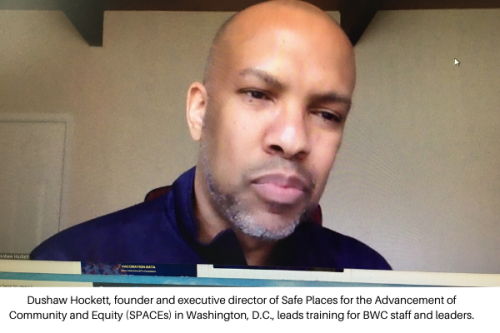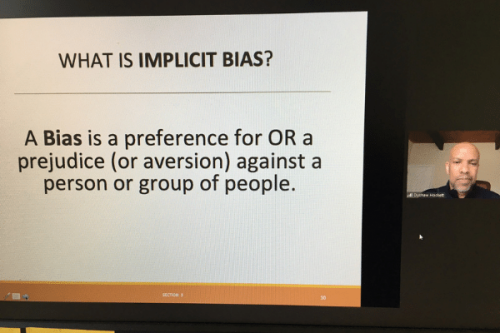BWC staff, leaders, receive Implicit Bias training
The leadership and staff of the Baltimore-Washington Conference are taking a deep dive on implicit bias, a journey they are modeling in hopes that other congregations will come along, too.
 The training, led by Dushaw Hockett, began last month as more than 60 participants gathered via Zoom. This is just one step on the way of building Beloved Community, Bishop LaTrelle Easterling said, a key focus for the BWC in the months and years ahead.
The training, led by Dushaw Hockett, began last month as more than 60 participants gathered via Zoom. This is just one step on the way of building Beloved Community, Bishop LaTrelle Easterling said, a key focus for the BWC in the months and years ahead.
“Part of our leadership team’s role,” said Francess Tagoe, Director of Human Resources and Benefits for the BWC, “is to provide some tools to help us grow, so that together, we can better understand and respect one another.”
Hockett is the founder and executive director of Safe Places for the Advancement of Community and Equity (SPACEs), a Washington, D.C.-based leadership development and community building organization dedicated to bridging the gap between what people imagine and what they achieve.
Implicit bias, Hockett said, feeds an overwhelming amount of harm in our society today. Implicit bias is a “preference for or a prejudice (or aversion) against a person or group of people.” Then, he added, “if we only think about bias as prejudice, we miss a lot.”
“At the core of all of our work,” Hockett said about Safe Places, “is the practice of bringing together people who don’t look alike, don’t think alike, and don’t talk alike, and doing that for the purpose of getting people to see bits and pieces of themselves in others.”
Hockett said that based on research, not only is there an overwhelming amount of harm stemming from implicit forms of bias but that strategies for addressing implicit bias differ from those strategies to address explicit forms of bias.
“If we want to move to a much more transformative place, as an organization or a country, around how we deal with issues of difference, then the way forward has to be to marry, to combine, the new and emerging tools with existing tools,” he said. 
Hockett walked the staff and leadership through five key characteristics of implicit bias:
- Implicit biases operate at a subconscious level – “We aren’t aware that we have them,” Hockett said. “And for the most part, they cannot be accessed through introspection.” In other words, he said, the science tells us that no one can “scratch their heads” and wonder if they have an implicit bias against certain groups of people and expect to accurately answer the question. “The nature of what makes a bias implicit is that you can never be too sure that that is what’s operating beneath the surface.”
- Implicit biases can run contrary to our conscious beliefs and attitudes – “The science says that our implicit biases in the behaviors and decision-making that stem from those biases can contradict every single word that comes out of our mouths that we say to people and stand for in terms of our core values,” Hockett said.
- Implicit biases are triggered through the rapid and automatic mental association of individuals/groups of people/objects and our attitudes AND stereotypes about them – Hockett said the two words in this characteristic are “rapid” and “automatic.” In other words, he said, “they are triggered within the blink of an eye.”
- Implicit biases are social and structured, not just individual – One of the critiques people make about implicit biases, Hockett said, is that it’s too focused on the individual, or too focused “on that brain stuff.” Hockett said that his response to that is “no, these biases that we all have don’t emerge from some deep, dark place from within our heads; it’s just the opposite. They are the result of our socialization experiences; they are the result of the things we absorb from the broader society over the course of our lives; things we see in movies; things we watch on TV; things we listen to; things we read in newspapers.” And then, he said, there are the people who impacted us at a young age – a relative, loved one, teacher, or hero – who said, “Watch out for that group.”
- Implicit biases are persistent, and they are pervasive – Every single human being has implicit bias, Hockett said. “And believe it or not, implicit bias is meant to be a good thing. These biases are meant to serve a purpose,” Hockett said. Mental shortcuts, he said, help us navigate life more efficiently. They are also meant to protect us from harm. However, these shortcuts can lead to harm when applied to other human beings, Hockett said, such as forming first impressions that may later turn out not to be true.
Hockett also offered several strategies to deal with implicit bias, from slowing down one’s decision making, to “individuating” (taking time to learn detailed information about the “other,” whoever that “other” is), perspective-taking, or walking in other’s shoes, and countering stereotypical images.
In a second day spent with Hockett on April 20, BWC staff and leaders learned that the way society deals with issues of difference “is inadequate and incomplete,” he said. The new strategies center around IDEA: Inclusion, Diversity, Equity, and Anti-Racism.
“The effective practitioner of this work,” Hockett said, “has a functional understanding of the history of racism and other forms of ‘othering.’” And it is not a simple matter of reading books or watching movies and regurgitating facts, he said. “But, instead, he, she, or they use history in service of three R’s: Remembrance; Repair/Restitution; and the practice of Re-Imagining.”
Practicing the strategies he outlined is imperative to transform society, Hockett said. “If we can get people to make these practices a way of life, it would be transformative.” And like the adage of “How do you get to Carnegie Hall,” Hockett said this practice isn’t a one-and-done scenario.
“If we can get individuals and organizations to habitually, habitually, habitually practice” these strategies, it would make a huge difference.
Hockett is already working with several congregations in the Baltimore-Washington Conference, said the Rev. Stacey Cole Wilson, Executive Minister of Justice and Service. Individuals may contact her at for more information.
The learn more about the work the BWC is doing to help build the Beloved Community, visit https://www.bwcumc.org/ministries/advocacy-action/racial-justice/.
